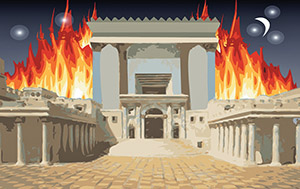
The fast of the 17th of Tamuz, which we observed this past Sunday, ushered in the Three Week period of mourning for the destruction of the two Batei Mikdash. Although the Mishnah at the end of Ta’anis lists five tragic events that transpired on that day, in regards to the destruction of the Temple the most significant event was that the Roman legions who had laid siege around Jerusalem finally penetrated the walls and burst into the city on that day. Once they had entered the city it was only a matter of time before the Temple Mount would succumb and they would destroy the Temple.
The breaching of the physical the walls of Jerusalem is symbolic of a deeper, more spiritual breach. In the Hoshanos prayers recited on Succos, we declare, “Ohm ani choma—I am a wall!” That “wall” represents the exclusiveness of the Jewish people. In the words of the wicked prophet Bila’am: “Behold! It is a nation that will dwell in solitude and not be reckoneda among the nations.” When that wall of exclusivity and uniqueness is breached, as a nation we become vulnerable to the spiritual and material dangers that lurk beyond those barriers.
When a groom and bride stand under the canopy together, the bride customarily circles around her future husband seven times. Then the groom places a ring upon her finger, effecting the marriage.
One of the ideas behind both customs is that it symbolizes the fact that a vital part of marriage is that each spouse form a proverbial protective wall around his/her significant other. The circuits she walks around him, and the circular ring he places on her finger, represent the fact that in their marriage they commit that their lives will circle and revolve around each other, first and foremost.
One of the greatest tragedies of our time is the atrophying of the nuclear family. The problem is further compounded by a liberal society that promotes a false sense of independence that does not promote familial bonding and marriage, in fact it denounces it.
A rebbe of mine noted that whereas in years past every Shabbos as he walked to shul he would hear church bells ringing for a wedding taking place inside, now as he walks to shul the bells are silent. There are far fewer marriages taking place. In the world at large people are comfortable living together without the burdens and responsibilities and commitment of marriage.
A husband and wife are supposed to be protective walls around each other, just as parents seek to be for their children. To our dismay and chagrin, in so many families those walls and protections have been breached.
The fast of Shiva Asar B’Tamuz does not merely commemorate a “historical breach.” On a symbolic level we mourn numerous breaches in many walls that comprise the House of Israel. It is a day, not only of tragic memories, but also of global attacks on our world, external attacks upon us as a people, internal attacks upon us as the bearers of the banner of Torah, and domestic attacks upon our families.
But the Three Weeks of mourning also carry hope for a better future. We are a nation of sanguinity and optimism, and that is why we have endured. So even with so much to mourn for we still anticipate the time of ultimate consolation, when our breaches will be repaired and our citadels will again stand firm and not compromised.
Rabbi Dani Staum, LMSW, is the Rabbi of Kehillat New Hempstead. He is also fifth-grade Rebbe and Guidance Counselor in ASHAR in Monsey; Principal of Mesivta Ohr Naftoli of New Windsor, NY and a division head at Camp Dora Golding. Rabbi Staum offers parenting classes based on the acclaimed Love & Logic Program. He can be reached at [email protected]. His website is www.stamtorah.info.
By Rabbi Dani Staum













